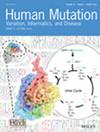Variant effect on splicing regulatory elements, branchpoint usage, and pseudoexonization: Strategies to enhance bioinformatic prediction using hereditary cancer genes as exemplars
IF 3.3
2区 医学
Q2 GENETICS & HEREDITY
引用次数: 1
Abstract
Human Mutation, 41, 1705–1721 (2020). https://doi.org/10.1002/humu.24074
Dylan Glubb co-supervised first author Daffodil Canson through an Honorary appointment at the University of Queensland and he should be recognized as affiliated to below affiliation [2] in the original paper.
2Faculty of Medicine, The University of Queensland, Brisbane, Queensland, Australia
剪接调控元件、分支点使用和假外显子化的变异效应:以遗传癌症基因为例增强生物信息学预测的策略
人类突变,41,1705-1721(2020)。https://doi.org/10.1002/humu.24074Dylan Glubb通过昆士兰大学的荣誉任命共同监督第一作者Daffodil Canson,他应该被认为是原始论文中以下署名[2]的附属机构。2昆士兰大学医学院,澳大利亚昆士兰州布里斯班
本文章由计算机程序翻译,如有差异,请以英文原文为准。
求助全文
约1分钟内获得全文
求助全文
来源期刊

Human Mutation
医学-遗传学
CiteScore
8.40
自引率
5.10%
发文量
190
审稿时长
2 months
期刊介绍:
Human Mutation is a peer-reviewed journal that offers publication of original Research Articles, Methods, Mutation Updates, Reviews, Database Articles, Rapid Communications, and Letters on broad aspects of mutation research in humans. Reports of novel DNA variations and their phenotypic consequences, reports of SNPs demonstrated as valuable for genomic analysis, descriptions of new molecular detection methods, and novel approaches to clinical diagnosis are welcomed. Novel reports of gene organization at the genomic level, reported in the context of mutation investigation, may be considered. The journal provides a unique forum for the exchange of ideas, methods, and applications of interest to molecular, human, and medical geneticists in academic, industrial, and clinical research settings worldwide.
 求助内容:
求助内容: 应助结果提醒方式:
应助结果提醒方式:


